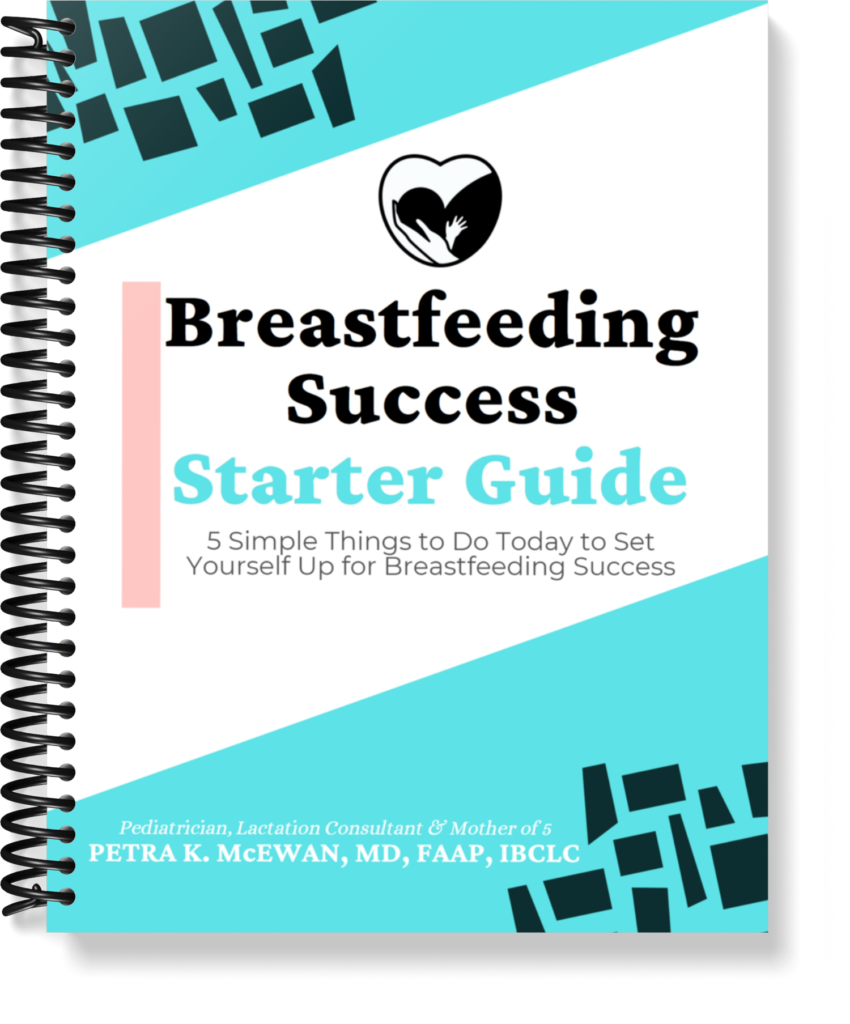“I’m not gonna sleep well for at least the next 4 months, maybe longer”. This thought hit me each and every time I delivered one of my babies in the hospital. Somehow, I forgot about my impending lack of sleep throughout my pregnancies. But, after I delivered and held my baby in my arms, I was reminded that my sleeping days were gone. You see, I’m a woman who loves to sleep. I love to sleep well at night, I love to take naps during the day (both on weekdays on my lunch break and on weekends with my kids). So, having a baby that wakes up to breastfeed every 2-3 hours really throws me for a loop each and every time. Somehow, I’ve survived this again and again – 5 times! Here are my best tips for surviving breastfeeding at night.
Remind yourself of the goal
It’s helpful to have some type of encouragement or goal when you’re going through a tough time like breastfeeding at night. Waking up every 2-3 hours at night isn’t easy. But, remember this when you’re up, exhausted every 2 hours: “it’s good for my supply, and good for my baby! Your baby will need to feed every 2-3 hours early on. His little tummy is so small and can only hold a little with each feeding. Plus, breast milk is easily digested, so that small amount in his tummy passes through quickly. Also, since breastfeeding is “supply and demand”, it’s important to keep feeding at night to maintain your supply in the early months.
Keep your baby in your room
Sharing a room with your baby, at least while you’re breastfeeding, can make things a lot easier. You can hear him and respond to his needs quicker. You’ll also have a shorter distance to walk, and will be less likely to arouse yourself. The American Academy of Pediatrics actually recommends keeping your baby in your room – but in his own sleeping space – for the first year of life, as a way to reduce SIDS (Sudden Infant Death).
Wear easy-access clothing
Make things easy by wearing a nursing top or pajama, or something that buttons down the middle. This will save you from having to fumble around with your clothing in the middle of the night.
Minimize distractions
Keep the light in the room dim so that you won’t arouse yourself or your baby too much. A nightlight may be all you need. Minimize distractions so that it’s easier for both you and your baby to get back to sleep. This will also help to teach your baby the difference between day and night. No playing, no singing, minimal talking. Just feeding and soothing back to sleep.
Be prepared
Having what you need on hand will also help to minimize having to get up and search in the middle of the night. Since you’ll likely need to change your baby with each feeding early on, have diapers and wipes nearby. A change of clothes and burp cloth can also be helpful for your baby. Have nursing pads on hands for yourself in case your breasts are still leaking at night. Keep a bottle of water and snack handy, too, since breastfeeding can make you thirsty and hungry. Keep a boppy pillow and whatever else you need for comfort close by. Set all of this up before you go to bed each night, to have it all within reach while you’re nursing.
Have your significant other help
Ask for help from your significant other – to wake up and change the baby before each feeding. He can then hand the baby off to you just for feeding. That gives you a few extra minutes of sleep and hopefully won’t wake you up as much. I don’t recommend having your husband regularly give your baby a bottle in the middle of the night unless you’re also up pumping, because this can decrease your supply in the long run.
Sleep when your baby sleeps
I know this is a lot easier said than done. It’s not always easy, but can be so important. You don’t know what your days or nights will look like with a young baby, so it’s important to do what you can for yourself right now. Taking daytime naps when the baby’s sleeping will make the nighttime feedings a little less exhausting.
Get help during the day
Have someone help with cleaning, cooking, taking care of other kids, or even just watching the baby while you take a nap between feedings. This can help you to feel a little more rested. You’ll be more prepared to face those nighttime feedings. Get help from family, friends, or hire someone if you have to.
Take care of yourself
Trying your best to take care of yourself during the day can help you to feel refreshed. Take a shower, aim to eat well, get some exercise or stretching in. Try to do something you enjoy, to boost your spirits, to prepare for the unknowns of your nights.
Join a support group
There are several breastfeeding support groups around, many offered by hospitals to women after delivery. They’re basically groups of women who are breastfeeding, and they come together for help, support, and just to commiserate. Sometimes it’s helpful to talk to others who are going through the same thing you are. Knowing you’re not the only one up every 2 hours in the middle of the night is reassuring. Many groups involve a lactation consultant, too, who can provide help with breastfeeding problems.
Practice during the day
The more you practice breastfeeding during the day, the easier it’ll become at night. Once you have it down, you won’t have to fumble around at night and struggle with getting and keeping your baby latched on. Practice different positions, to see which is best for nighttime. Limit pacifiers and bottles in the first few weeks so that your baby can practice at the breast. Keep at it til you both get the hang of it. Practice makes perfect!
Keep a positive attitude
In the midst of those sleepless nights, remind yourself that by breastfeeding, you’re feeding your baby the best possible way you can. You’re also doing wonders for yourself. Your breast milk is something unique, that only you can give to your baby. It’s designed especially for him. And, at least you don’t have to get up and prepare a bottle! Also remember that your baby won’t be this size forever. Savor these times now, even though it’s rough, because I promise you’ll miss them as he grows (as crazy as that sounds).
The Academy of Breastfeeding Medicine also shares these tips for breastfeeding at night:
Sleep near your baby. You and your baby will fall asleep more easily. Consider using a co-sleeper attached to your bed (also called a sidecar). Breastfeed while lying on your side.
Avoid getting up at night. Sitting up and getting out of bed will disrupt your sleep. Skip most diaper changes at night. Protect your baby’s bottom with a barrier cream. Breastfed babies don’t usually require burping.
Keep the lights off at night. Turning on lights disrupts your family’s sleep. Avoid night-time activities that require lighting or use a dim red light. Close electronic devices.
Breastfeed at night rather than pump or use bottles, if you can. Your night-time milk contains melatonin. Melatonin helps your baby sleep. Pumping and bottle feeding
disrupt sleep.
Avoid feeding solids or formula to improve sleep. Parents of formula fed babies may experience more sleep disruption than parents of breastfed babies. Giving solids or formula before 6 months may decrease milk production.
Do not sleep train in the first 6 months. It is not recommended in the first year. Instead, a cued care program for infant sleep can help parents cope.
One day, your baby will sleep longer stretches (or even through the night!), and you’ll wake up like me wondering where the baby is and if he’s ok! Your breasts will be heavy, full, leaking, and painful. But, you’ll feel like a new woman, knowing that you just got a decent night’s rest. This may happen early on for some women, or may take many months (or a year!), but it should happen. Keep that in mind while you’re going through this rough, sleepless patch. Surviving breastfeeding at night will soon be a thing of the past. It can only get better from here!
Do you have any other tips for surviving breastfeeding at night? I’d love to hear them. Just leave them in the comments below!
Looking for more help?
If you’re experiencing any breastfeeding issues – or if you just want to make sure you’re doing things right – I’d be happy to help. Take a peek at the different types of breastfeeding consultations I offer, and request an appointment when you’re ready. I’m here for you and all your breastfeeding needs!
The post originally appeared on Wifey Mommy Doc, a blog focused on helping working wives and moms find balance in their many roles.
Surviving Breastfeeding At Night

If you love these tips, be sure to check out my 75+ page digital library, filled with step-by-step instructions and the tools you need to learn the basics and adapt to life while breastfeeding, troubleshoot breastfeeding problems, go back to work while breastfeeding, wean – and so much more!





